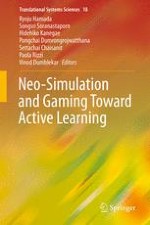2019 | OriginalPaper | Chapter
Educational Gamification: Challenges to Overcome and to Enjoy
Authors : J. Tuomas Harviainen, Mikko Meriläinen
Published in: Neo-Simulation and Gaming Toward Active Learning
Publisher: Springer Nature Singapore
Activate our intelligent search to find suitable subject content or patents.
Select sections of text to find matching patents with Artificial Intelligence. powered by
Select sections of text to find additional relevant content using AI-assisted search. powered by
